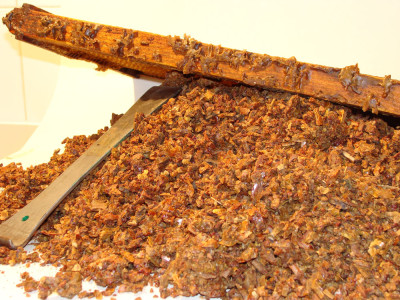Propolis

Propolis is the result of bee`s digestion and is collected from the duds of poplars and alders, from the leaves, from the buds and the bark of coniferous and poplars, from sweet willow and plum trees. It is produced at the same time with honey and is made by specialized bees. Propolis is collected and processed in warm days when temperature is higher than 20oC, and it starts showing a plastic aspect. The resin products collected by bees from the above mentioned species of trees are combined with saliva secretions and beeswax. Propolis has a solid form, a resinous aspect and may have a green color, but it can be brown and black, too.
Recommendations:
Its therapeutic action is determined by the nature of the component substances. It is antibacterial, antibiotic, has a healing capacity, it is immunologic and anticonvulsive. Propolis has good effects in healing wounds, sores, diseases of the breathing apparatus, of the digestive apparatus, of the eyes, prostate and it helps increase the microbes’ sensibility to antibiotics. Thanks to its effects against viruses, propolis is recommended for hepatitis, Zoster and herpes.
Propolis doesn’t have a toxic effect upon your body but, extremely rare, it may cause allergic reactions; that’s why the administration should start with the determination of whether the patient is allergic to its components.
Administration (therapeutic ways)
–Propolis Spray 10% for burns and skin affections
–Propolis Tablets which are chewable and used as a oral antiseptic, but are also recommended for digestive and urinary ways diseases
–Propolis Tincture-( is an alcoholic extract, usually containing 30% propolis and it has an internal and external usage) is very useful in serious skin affections (burns, hard fleshes, cuttings, herpes, etc)
–Propolis Ointment, for contusions and cells’ regeneration
–Honey with propolis, for influenza viruses, respiratory infections

 Romanian
Romanian  English
English